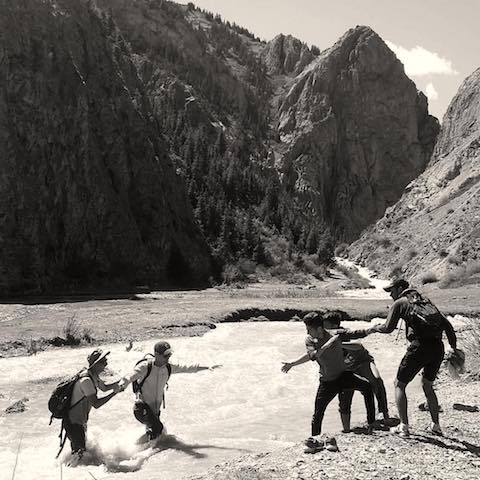Obama’s list has much more up-to-date books. But I heard the current guy doesn’t read, so???
From the latter half of 2016 to end of 2017, I had a lot more time to read books than I had in the previous 4 years (or so I tell myself). I guess that’s the perk of no longer having required readings for classes. Here’s what I remember reading in 2017, what I started and plan on finishing in 2018, and what other books I plan to read.
What I finished:
-
The Things They Carried by Tim O’Brien
Fiction and truth have no clear boundaries in this collection of short stories. A few stories were particularly memorable: “Sweetheart of the Song Tra Bong”, “Speaking of Courage”, “Field Trip.” -
Isma’ili Modern: Globalization and Identity in a Muslim Community by Jonah Steinberg
This book was very relevant because I was working for an AKDN agency and with lots of Ismaili coworkers and students. Gave really interesting insight into the Ismaili communitiy, history, and institutions. It also made me very excited to go to Khorog. -
Hillbilly Elegy by J.D. Vance
I was not expecting to be this interested but I was totally hooked from beginning to end. It’s written in a very readable manner. Best when Vance is talking about his own experiences (told in a very engaging manner). Weaker when he tries to extrapolate said experiences into social policy and when he tries to generalize the experiences of other people. -
Jobs to Be Done: A Roadmap to Innovation by Steve Wunker, Jessica Wattman, and Dave Farber.
I read this for work. My boss(es) wrote it and a lot of the firm’s current work is based on it. -
Capturing New Markets: by Steve Wunker
Boss wrote this one too. It’s about capturing new markets. -
The Pyramid Principal: by Barbara Minto
IIt’s a book about writing. The basic principals apply well to constructing PowerPoint slides in an ordered way. It’s not terribly exciting writing for a book about writing though. -
Why Information Grows: The Evolution of Order, from Atoms to Economies by Cesar Hidalgo
Hidalgo asserts that information is embodied in physical order. Lots of interesting concepts but I found myself getting lost around his definitions (“information”, for example). -
Political Order and Political Decay by Francis Fukuyama
This was pretttttyyyy long and fairly repetitive (almost 700 pages). That’s not to say it wasn’t interesting though (it was). You learn that when states democratize before the formation of strong centralized institutions, they’ll tend to be clientelistic (because Fukuyama tells you 50+ times). -
Black Panther: A Nation Under our Feet by Ta-Nehisi Coates
This isn’t a book. It’s a comic but it’s by Ta-Nehisi Coates so the literary value is automatically there. I really liked how he presents Wakanda: rich history, mythos, and tradition; sophisticated citizens, great looking traditional garb. It makes me want to get read and see more depictions of my own family’s past (alas, my Chinese skills should be stronger).
Started but didn’t finish:
-
Inspiration and Incarnation by Peter Enns:
Recommended to me by Miriam; part of her Duke Divinity School readings. An examination of the Old Testament and its textual/theological tensions. -
Origins of Political Order by Francis Fukuyama:
I first started reading this in Kazakhstan while lying on my back on the top bunk of a Talgo night train from Almaty to Astana. Like the sequel, it’s pretttttyyyy long. -
Between the World and Me by Ta-Nehisi Coates:
I actually finished this! But in 2018. -
The Silk Roads: A New History by Peter Frankopan:
History from a lens of the various Silk Roads connecting the world. It’s really cool to 1) get a non-Eurocentric approach to history and 2) recognize some of the places in Central Asia and Asia that are mentioned in the book. -
So Translating Rivers and Cities by Zhang Er:
A book of poetry with both the original Chinese text and it’s English translation. It’s really interesting to see the translation approaches that each translator uses and the amount of editorial discretion exercised. -
Russian Course by Nicholas J. Brown:
At some point in my life, I will learn Russian. That’s what I tell myself.
Other books I want to read in 2018:
-
Blood Meridian by Cormac McCarthy:
I’ve been reading this book for 6 years. I like it but it’s been quite the slog. -
The Three Body Problem by Cixin Liu, translated by Ken Liu
I want to read my sci-fi. The combination of sci-fi + Chinese history is very compelling to me. -
The Brothers Karamazov by Fyodor Dostoevsky
Ambitious, I know. -
Ted Chiang short stories: Continuation of the sci-fi by authors of Chinese heritage theme. I really enjoyed some of his stuff in high school. Also, Arrival was based on one of his stories.
